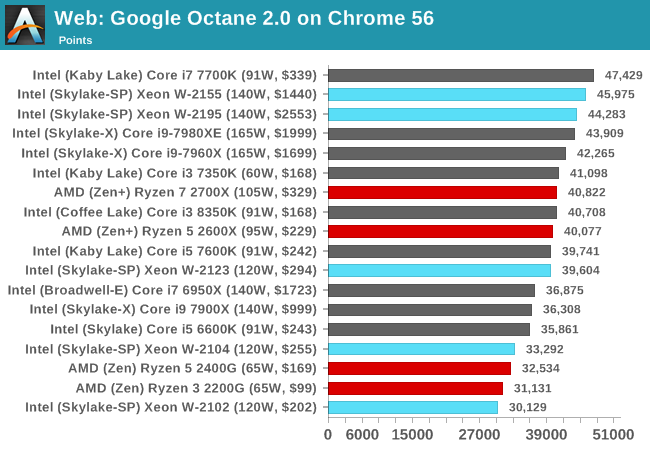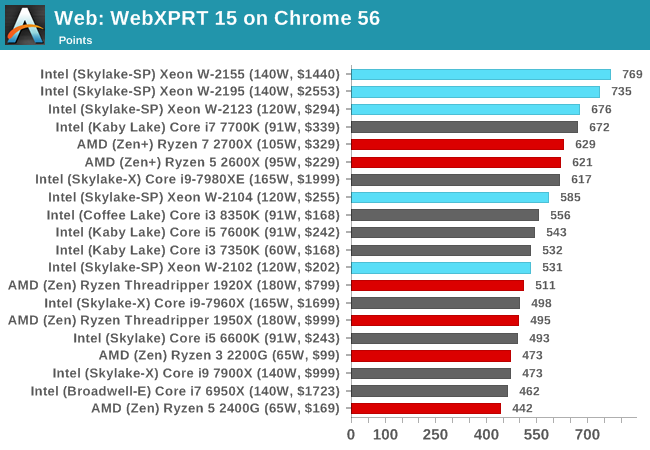The Intel Xeon W Review: W-2195, W-2155, W-2123, W-2104 and W-2102 Tested
by Ian Cutress & Joe Shields on July 30, 2018 1:00 PM EST- Posted in
- CPUs
- Intel
- Xeon
- Workstation
- ECC
- Skylake-SP
- Skylake-X
- Xeon-W
- Xeon Scalable
Benchmarking Performance: CPU Web Tests
One of the issues when running web-based tests is the nature of modern browsers to automatically install updates. This means any sustained period of benchmarking will invariably fall foul of the 'it's updated beyond the state of comparison' rule, especially when browsers will update if you give them half a second to think about it. Despite this, we were able to find a series of commands to create an un-updatable version of Chrome 56 for our 2017 test suite. While this means we might not be on the bleeding edge of the latest browser, it makes the scores between CPUs comparable.
All of our benchmark results can also be found in our benchmark engine, Bench.
*Due to some issues in our web testing, only the following tests had scores that were comparable.
Google Octane 2.0: link
Along with Mozilla, as Google is a major browser developer, having peak JS performance is typically a critical asset when comparing against the other OS developers. In the same way that SunSpider is a very early JS benchmark, and Kraken is a bit newer, Octane aims to be more relevant to real workloads, especially in power constrained devices such as smartphones and tablets.

WebXPRT 2015: link
While the previous three benchmarks do calculations in the background and represent a score, WebXPRT is designed to be a better interpretation of visual workloads that a professional user might have, such as browser based applications, graphing, image editing, sort/analysis, scientific analysis and financial tools.











74 Comments
View All Comments
0ldman79 - Tuesday, July 31, 2018 - link
Agreed.I imagine there will be several situations where the 6 core 12 thread i7 will outperform the i9 9700.
If the cache increase is enough that may not happen, but I'm not betting on it making up enough of a difference.
Icehawk - Friday, August 3, 2018 - link
The 8086 is functionally equivalent to the 8700, they trade blows in a pretty tight grouping so I don’t mind that they used it’s scores.mode_13h - Monday, July 30, 2018 - link
Their pricing is nuts! These can only make sense if you're desperate for PCIe lanes or lots of cores (and, for some reason, don't want AMD).I have an older E5 Xeon and wanted to replace it with a W-series, but I can't justify this pricing (or the performance hit taken on the lower-core-count models, relative to desktop/E-series chips). I will have to opt for either an E-series Xeon or a Ryzen. At this rate, I see myself going for a 7 nm Ryzen, actually.
I think AMD is smart for using narrow AVX units. > 256-bit doesn't really make sense for much that wouldn't be better-served by a GPU. AVX-512 was a strategic misstep for Intel, and they're just going to have to live with it.
mode_13h - Monday, July 30, 2018 - link
Oh, and let's not forget the IHS TIM issue.I'm not in the market for > 8 cores, but those who are will be disappointed by the rate of thermal throttling, due to this being their first (recent) workstation/HEDT chip with a non-soldered IHS.
0ldman79 - Tuesday, July 31, 2018 - link
I missed that.The IHS is using TIM even on the Xeon now?
That was honestly the one big reason I was looking at the Xeon. That's just a poor business decision. Xeon carries a price premium, they could at least guarantee the heat conductivity is going to be enough to keep it running cool and smoothly for the life of the chip.
mode_13h - Wednesday, August 1, 2018 - link
I don't know this for a fact, but their Xeons are normally just binned HEDT processors without the special features fused off. So, I assume it's the same crappy TIM under that IHS.Comparing thermal performance @ the same clock for 10+ core models vs the i9's would easily show whether this is true.
HStewart - Monday, July 30, 2018 - link
"I think AMD is smart for using narrow AVX units. > 256-bit doesn't really make sense for much that wouldn't be better-served by a GPU. AVX-512 was a strategic misstep for Intel, and they're just going to have to live with it."AMD's AVX 2 is only 1/2 of Intel AVX 2 - that sound like they are using dual 128 bits instead 256 bits
Also keep in mind Intel CPU also have AVX 2 support your statement makes no sense.
HStewart - Monday, July 30, 2018 - link
https://forums.anandtech.com/threads/ryzens-halved...bill.rookard - Monday, July 30, 2018 - link
The thing is - and this is somewhat critical for a workstation based board, you're NOT really going to be using it for single threaded tasks. You'll be using software which has for the most part SHOULD be multi-threaded. Considering that the Threadripper is a 16c/32t CPU in the gen1, and running for a street price of about $800ish, and the gen2 is going to be a 32c/64t beastie of a CPU at a price of $1500ish, why would you spend $2500 on a 18c/36t Intel CPU?You could just as easily do some research to find people who have indeed put together some TR/ECC combos, and put a complete AMD system for the price of an Intel CPU alone.
mode_13h - Tuesday, July 31, 2018 - link
That's nuts, dude. For software development, I want lotsa cores for parallel builds. When recompiling only a few files, I want fast single-thread perf.The reality is that there are still lots of places in day-to-day computing where single-thread perf matters. I don't know how you can possibly believe you accurately represent the needs of all workstation users, but you don't.